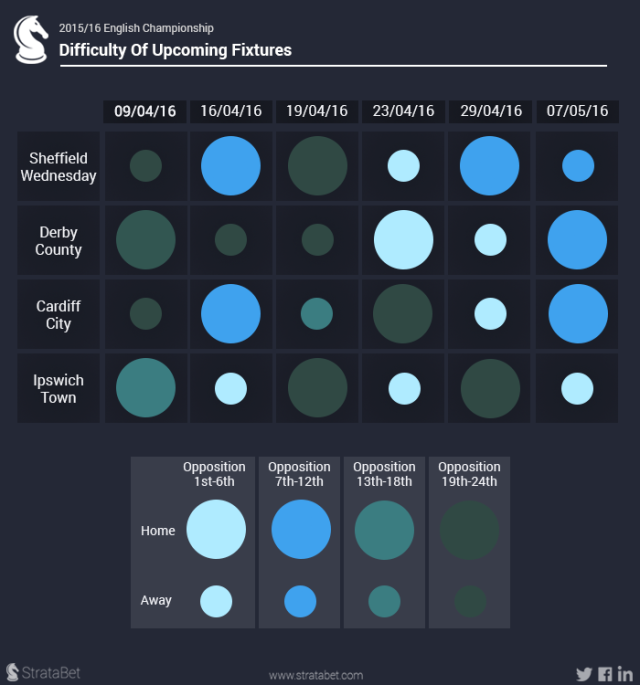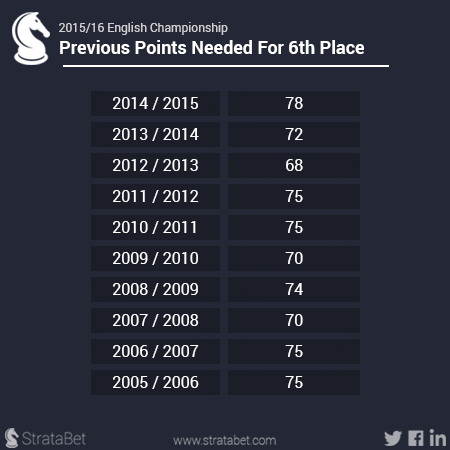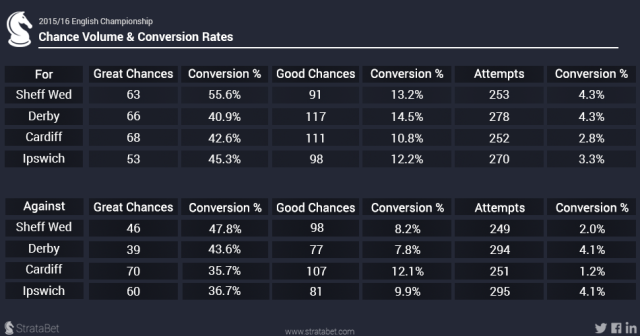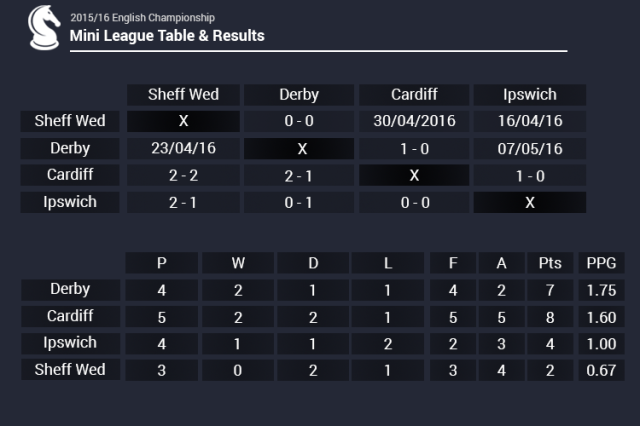This blog was originally posted on StrataBet Trading Expert (08/04/16)
The English Championship continues to be a fiercely competitive division. At the top end of the table the recent poor form of Hull and Middlesbrough has created what now looks to be a four-way fight for the two automatic promotion spots. At the bottom the recent resurgence of Rotherham under Neil Warnock has given them a great chance of avoiding relegation. Bolton and Charlton look doomed, but there are other teams who could still be dragged into the fight. Indeed, MK Dons look set to join them after poor results in their last two games.
The focus of this piece will be the race for the two remaining play-off places. Derby secured an excellent victory over Hull on Tuesday and it looks like four teams will be competing for two places, just like in the race for automatic promotion. Birmingham seemed to be in contention before the weekend but defeats to Charlton and Brighton have left them facing an almost insurmountable task, despite the fact that they have a game in hand.
The Contenders

Sheffield Wednesday
After a huge improvement last season under Stuart Gray, this season saw a new and largely unheard of manager Carlos Carvalhal arrive, and with the backing of fresh investment Wednesday have been excellent this season. Their aim at the beginning of the campaign was a top half finish, but it will now be disappointing if they don’t make the top six. They have a squad high on quality but they can be overly reliant on the talismanic Fernando Forestieri, with few players capable of acting as a direct replacement. Wednesday have a very strong spine and will be the favourites to finish sixth.Derby have history with missing out on the play-offs after last season’s dismal finish and they will be determined not to let the same happen again. They have already had a bad spell this term when they dropped from first to fifth and Paul Clement was sacked after less than eight months in charge. Despite sound bites from the club that promotion is not their primary aim they will not want to miss out, but need to get the team playing a cohesive style. They can often look disjointed and tend to struggle against more physical sides.
While Cardiff fans have recently had a taste of the Premier League they have emerged as unexpected challengers this season after cost cutting seemed to hinder any kind of push. Resentment towards owner Vincent Tan, plus a general dislike of Russell Slade and his style of play seems to have diminished slightly as a togetherness within the team has seen them only lose twice at home all season. Their lack of strikers could be their major downfall in the end, but they have been able to spread the goals around the team so far.
Having missed out on the 2014/15 play-off final after losing to local rivals Norwich in the semi-final, another shot at the top six was the aim for this campaign. Despite losing key players like Tyrone Mings and with very little investment Mick McCarthy has again worked wonders to get them competing at the top end of the division. Their style of play is still direct and aggressive, but there is perhaps not quite as much long ball play as there was last season and they still remain effective. Daryl Murphy remains their most dangerous player, but he has regressed from last season when he hit an unprecedented 27 goals, which was more than his total in the previous four years combined. Murphy’s saving grace is that he adds a lot of value to the team even when not scoring, so Ipswich will hope the injury he picked up on international duty is a minor one.
Sheffield Wednesday ~1.11
Cardiff City ~4.5
Ipswich Town ~15.0
5th-12th placed opposition – Draw
13th-18th placed opposition – Win
19th-24th placed opposition (home) – Win
19th-24th placed opposition (away) – Draw
6th – Derby County (74pts)
7th – Cardiff City (73pts)
8th – Ipswich Town (70pts)
Derby County
Cardiff City
Ipswich Town
Schedule
As shown in the table below the teams face run-ins of various difficulties. On paper it appears that Ipswich have the hardest set of fixtures with three away games against current top six sides, all coming in the final five games of the campaign. Cardiff have just come through a tough spell against teams in the top six themselves and took a very respectable four points:

It should be noted that because Sheff Wed and Derby currently reside in the play-offs they obviously count as members of the top six. Wednesday still have all three play-off rivals to face, with two of these games being at home, and it is these three games that should be most vital. Derby have perhaps the easiest run in of the four sides, purely due to their games against teams in the bottom six.
Ipswich’s trio of difficult away games sandwich two games at home against teams in the bottom three. While this may seem like a massive bonus, at this stage of the season it may actually be a huge banana skin compared to playing a mid-table side with nothing to play for. This was shown on Tuesday night when they struggled at home to a determined Charlton side.
In previous seasons 70 points has been seen as the benchmark needed to make the top six. However, this would only have seen a team make the play-offs in three of the last ten seasons:

75 points actually seems a much more reasonable target, especially with the number of teams chasing down the play-off spots. 75 Points would be enough in nine of the last ten seasons, with only last season throwing up an anomaly as Wolves (78 points) and Derby (77 points) both missed out. These were the highest totals to do so since the Championship switched to its current format of 24 teams in the late 80’s.
StrataData
Using StrataData we can look at some key indicators as to how each of the teams have performed over the season:

From this we can see there are only marginal differences between the teams. Cardiff, Derby and Sheff Wed create a similar number of Great Chances (~1.5/1.6 per game), but Wednesday convert them at a much better rate. While this may be expected to decline, the small number of games remaining means that this is unlikely to happen before the end of the season.
Sheffield Wednesday actually have the best conversion rate across two of the three categories, which is a big reason for why they are the second highest scorers in the league (behind leaders Burnley). This is a real change from last season when they scored the fewest number of home goals in the division – even less than the bottom three.
Derby’s Great Chance conversion rate is the lowest of the group, but they make up for this by not only having the highest conversion rate of Good Chances, but also creating many more of these than the other sides. Ipswich’s rates are also quite good, though not at the level of Wednesday and Derby. This could be an indicator of some quality in their shooting but it could also be an indicator of an uncontrollable luck factor too.
Defensively, it is again Derby who look most impressive, giving up the lowest number of Great and Good Chances, with a low conversion rate on those Good Chances as well. Wednesday also seem to be skilled at preventing chances but the conversion rate on the Greats shows that if they concede one there is almost a 50% probability of it being scored. Naturally, preventing these situations is a must for Carvalhal’s men, but fortunately for him he has a solid defence.
Another thing to consider here is the fair outcome for each team in the table, which is basically StrataData’s “fair score” of their games. This is based on various metrics and is designed to show that if a team were to play the same game 100 times in the same situation would they be more/less likely to get something out of it. These scores are then added up in the same way a league table would be and the top four is quite representative here:

It seems that only Brighton are not truly worthy of their place in the top four, though even by this method they would still be 7th, which is not a big stretch giving the strength of the league. Chris Hughton’s side had a great start to the season, but drew a lot of games that they could have lost on many other days.
Using this technique to observe the four teams we are focusing on reveals a different story:

While Wednesday apparently deserve their fifth place, the other teams could be in much different positions in the table. Derby are ranked at the top and this shows that a combination of bad luck and poor form has seen them slip out of the running for the automatic spots. Cardiff and Ipswich look like they may be over-performing, as they are ranked 10th and 13threspectively. This shows that they are grinding out wins that they may not have got on any other day. However, this does not mean they are not deserving of a top six place, but that they have consistently achieved better results than they have been expected to.
This is far from perfect, but provides an indicator of which teams could be over- or under-performing. It is interesting that the other team who deserve to be in the top six is actually Blackburn who sit way down in 16th – while losing Gestede and Rhodes is not easy to cope with they have badly underperformed this season.
Mini League
One final thing to look at is the impact of these teams playing each other. We have already mentioned that there are still a number of games between the sides due before the end of the season. Cardiff have the fewest fixtures against the other teams competing for a play-off place and this could be a benefit, as if they do win when two of their rivals compete they have an increased chance of taking advantage of both dropping points at the same time.
Of course these games are destined to have a significant impact on how the race for sixth finishes up. If Wednesday were to lose their three games against close rivals but win the three other it would likely see a much tighter finish than they would like. As such, picking up points in these matches is key.
Previous results between these teams this season look like this:

As there is quite a difference in how many games they have played against each of their rivals it should be noted that Sheffield Wednesday have picked up less than a point per game against the teams around them. Even with three matches to play this is not a positive statistic, especially when you see that they have also failed to take any wins from the top four sides as well. Derby look understandably strong and with two home games to come they will be looking to further strengthen their position. It is often breaking those teams who look to defend down that has been their undoing, so playing against opponents that might need to go for a win will surely help them.
Who has the edge?
The market has Derby and Sheffield Wednesday as clear favourites (odds as at 6/4/16):
Derby County ~1.08
These prices seem quite reflective of the information that has been covered here so far. As an example, Sheffield Wednesday are likely to need around seven points from their final six games to reach the previously mentioned 75 points. This could be achieved with wins against the two teams in the bottom six that they are due to play, leaving them needing just one point from the remaining four games.
Let’s finish with some rough estimates and assume the following:
1st-4th placed opposition – Lose
This leaves the table at the end of the season as follows:
5th – Sheffield Wednesday (76pts)
There could be some value in Cardiff as they are close to the teams above in the projected final table despite their much longer odds. Indeed, a win for Slade’s team away to Sheffield Wednesday would leave both clubs on 75 points.
We will have to wait until the 7th of May to see how accurate this is but there are sure to be plenty of twists and turns before then. Knowing The Championship, it will certainly be an exciting end to the season.
Dave Willoughby (@donceno)